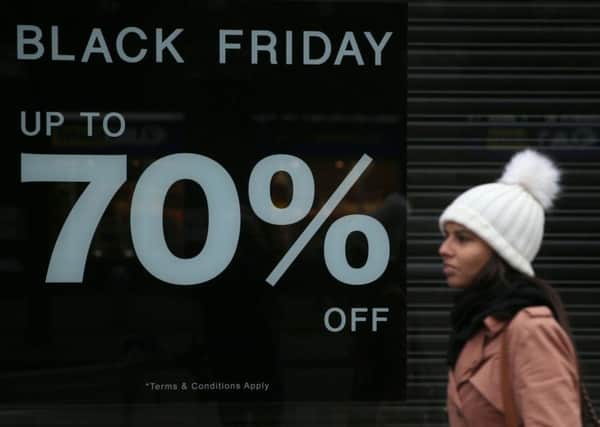Top tips for shoppers ahead of Black Friday


Coming the day after the American holiday of Thanksgiving, when many Americans have a day off work, it has traditionally marked the start of the Christmas shopping period since the 1950s.
While many retailers in the UK have jumped on the bandwagon, seeing it as a chance to rake in extra cash and lure in shoppers, negative publicity such as riots in some stores, as customers fight over discount electrical goods, has prompted some to pull out.
Advertisement
Hide AdAdvertisement
Hide AdTwo years ago, Asda said it would not take part in the sale and it is not clear whether it is likely to make a return this year. Also opting out was Ikea, Next and Homebase.
However, others are expanding the concept further. Perhaps looking to mix it up, this year, Amazon extended its “Black Friday” deal period from one to ten days for the first time. Other major brands due to take part include the Disney store, Argos, Boots and New Look. Even hotel chains are getting in on the act, with Mercure and Novotel Hotels offering 30 per cent off stays booked over the Black Friday/Cyber Monday weekend, while Pets at Home has also slashed prices on some animal accessories.
However, while headline bargains appear to be great deals for shoppers, many consumer experts have warned that they are not necessarily all they seem.
An investigation this week by Which? found that six in 10 of last year’s Black Friday deals were cheaper or the same price at other times of year. Shoppers should “look at the price, not the ‘saving’,” it warned.
While time is key in nabbing the best bargains, shoppers shouldn’t impulse buy.
Having a list ready of the things you actually need and would buy anyway will help curb any unnecessary purchases.
Checking out whether any other vouchers - such as free delivery - are available at stores you plan to shop in ahead of time can save you money on the day. Meanwhile, starting early is also a good idea, with many of the best buys likely to be sold out on Friday morning.
Security experts warn that any websites which do not have encryption - shown y the https address and the green lock at the top of the page, should not be used.
Advertisement
Hide AdAdvertisement
Hide Ad“If a website isn’t encrypting their website in 2017, let alone their payment processing page, then they cannot be trusted to handle your credit card information properly either,” said Travis Smith, principal security researcher at Tripwire.
Historians believe the term Black Friday originally referred to the traffic chaos which ensued when people were travelling home after Thanksgiving and stopping in shopping malls and town centres to pick up Christmas gifts on the way.
Of course, in the UK, there is no such reason for this day to be the first shopping day - most people are not on holiday - however, as with many cultural approriations, the tradition has been adopted from the US.
The more modern idea of Cyber Monday - the day after Black Friday weekend when people turn to online shopping - has, of course, developed in recent times, and shoppers can find plenty of deals online.